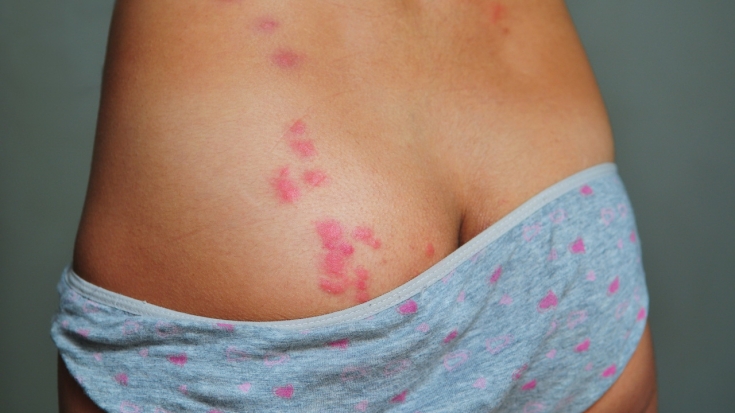With the advent of heat, it is not only possible to take a walk in the park or go out of town for a picnic, but also get bitten by parasites that also wake up during this period. It is almost impossible to completely avoid contact with them, because, for example, you can’t get away from mosquitoes that are harmless at first glance. How to go on vacation and avoid unpleasant consequences? – First of all, you should have a first aid kit with you, because the most common reaction of your body to contact with the parasite – It's an allergy to insect bites. This phenomenon is associated with seasonality and it is in the spring that its peak falls. This article from estet-portal.com will help prevent unpleasant consequences.
Insect sting allergy: why it happens
Let's start with the fact that almost every parasite releases poisons during contact, they act as allergens for the human body. Negative consequences after a bite occur only when a person develops antibodies to the presence of this poison.
There are several reasons for negative reactions:
• heredity, when a person has a predisposition to allergies;
• wrong diet, which includes a large number of products with dyes, flavors, etc.;
• certain diseases of internal organs;
• bad ecology.
It is important to know that manifestations can be from the bite of any insect, but more often those that are of the "stinging" type, and less often – «bloodsucking».
Insect sting allergy symptoms
There are two types of reactions:
• immediate, which can appear from the first seconds after contact and last from several hours to several days;
• delayed, manifesting itself a few hours after contact.
Allergy symptoms are also divided into several groups:
• local symptoms are presented in the form of redness, itching, swelling or swelling at the site of the bite, they disappear over a short time;
• general symptoms are manifested in weakness, headache, nausea, fever, difficulty breathing, etc.
There are more serious symptoms, which are characterized by spasm in the bronchi, swelling of the larynx, collapse or anaphylactic shock
How to Diagnose an Allergy to Insect Stings
To avoid negative manifestations or pronounced reactions from contact with insects, it is important to diagnose allergies in a timely manner. In most cases, you can independently determine what exactly bit you and whose poison caused the reaction, but sometimes only a doctor can figure out the diagnosis.
Usually, if a bee has bitten, then there is a stinger on the affected area, but if there was contact with a wasp or hornet, then they do not leave a stinger. Multiple bites are left by ants or mosquitoes. In any case, if you have serious symptoms, you should consult a doctor who, using a skin-allergic test, can establish an accurate diagnosis.
How to help with insect sting allergies
The main task at the first manifestations of an allergy is to contact a doctor, but before he arrives, you can put an ice pack on the bitten place or something cold. Treatment of allergies depends entirely on the degree of its course, the following drugs are recommended, which:
• slow down the spread of poison throughout the body;
• reduce allergic manifestations;
• preparations that have a calming effect, helping and treat a burn on the skin etc.;
When the acute process is over, the doctor may prescribe an allergen-specific immunotherapy that fights the allergy, not its symptoms.

Traditional medicine in the fight against allergies in insect bites
If there are no antiallergic drugs at hand, then at home you can turn to folk recipes for dealing with the problem:
• lemon, a fruit that resists the poisons of almost all parasites, the damaged area can be wiped with its crust;
• garlic is another helper, you can use its juice or gruel, applying to the damaged area;
• onions will relieve itching if you rub a wound with a cut onion;
• Apply fresh parsley leaves to the bitten area;
• a piece of raw potato can also be applied to the affected area.
Such actions are welcome if the reaction symptoms are itching and swelling and there is no need to see a doctor.
Prevention measures for insect sting allergies
The main preventive method – exclude contact with parasites, but in many cases this is impossible, because going out into nature in summer and spring is inevitable, as is the presence of insects there. It is important to follow simple rules:
• if you have severe allergic reactions to parasites, then during the dangerous period, take a course of antihistamines that your allergist will approve;
• take a first aid kit with you, where there will be antiallergic drugs;
• try to avoid contact with insects whenever possible.
Your task – protect yourself and loved ones from the negative consequences of allergies, because even a mosquito bite can have dangerous consequences.
Reaction to contact with parasites has several degrees, ranging from weak – swelling and itching, and ending with a pronounced – anaphylactic shock and laryngeal edema. It is important to consult a doctor in a timely manner and provide first aid to a bitten person.
No matter how much you wish it, it is impossible to get rid of parasites in nature, and if you can protect yourself from mosquitoes by first smearing them with gels that repel them, then no one is safe from a hornet flying past a picnic. An allergy to insect stings can range from a harmless swelling to a severe anaphylactic shock with a fatal outcome. Therefore, do not neglect the precautionary measures and, with obvious symptoms, immediately consult a doctor. There is nothing better than spending a weekend in the fresh air, but it is worth considering all the dangers of such a holiday and having a first aid kit on hand.






Add a comment